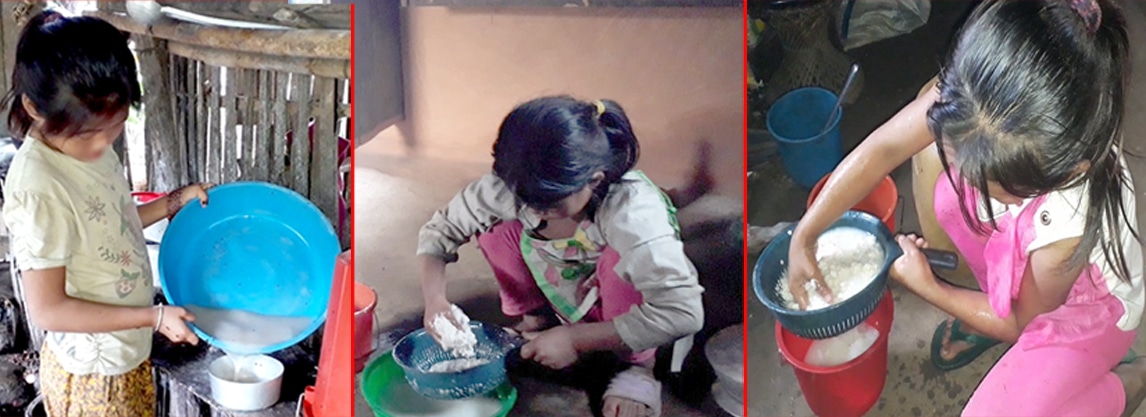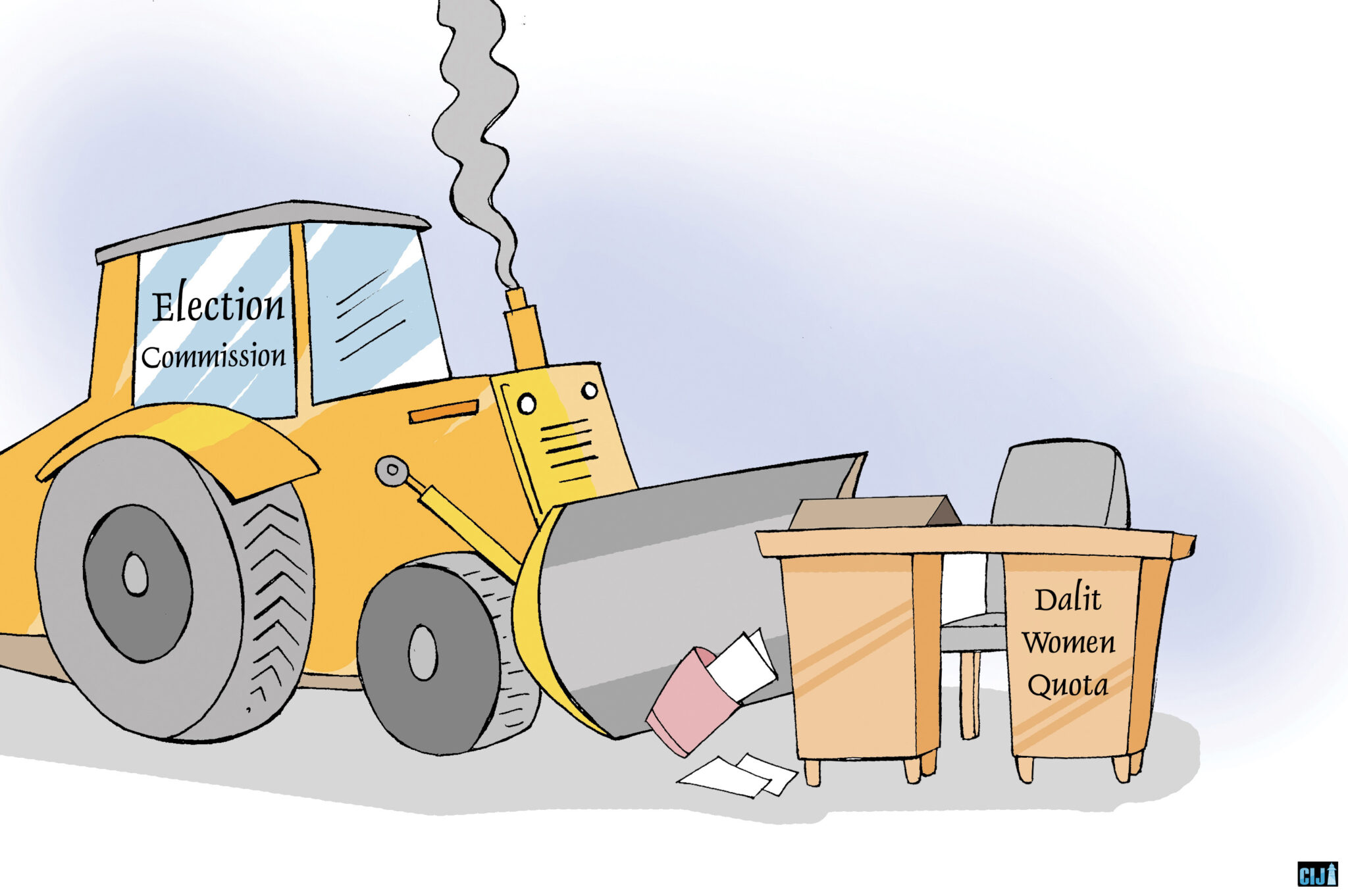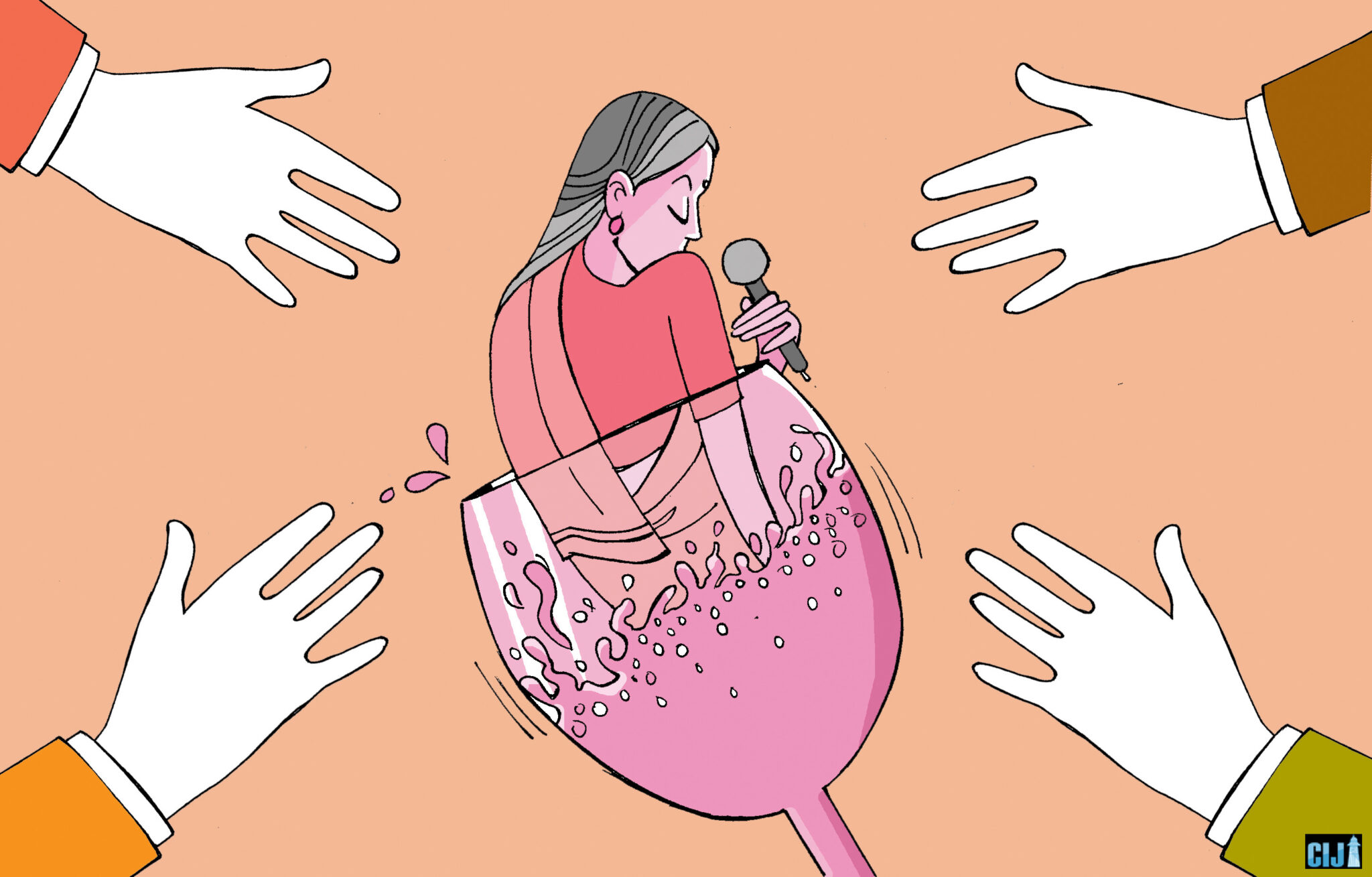The story of local liquor shops in markets of Chowkbazar and Dovan of Bhojpur district have been excruciating with lassies brewing and selling their products. This has been going on for years. These are some commonplaces where ‘alcohol lovers’ openly drink and stagger.
-Bidhya Rai: Centre for Investigative Journalism- Nepal
- Fourth-grader, Ramita Rai, 10, of Hatuwagadi-9, southern Bhojpur is the youngest child of her parents’ five children. Acquaintances often bump into her at the Ekhabakhola confluence near Aamchowk village where she assists her parents to brew and sell alcohol. In fact, she single-handedly does all the chores when her parents are away. Ekawakhola dobhan (confluence) is a popular center for locals of Dummana, Dewantar, Pawala and Hasanpur. Locals from these villages frequently pop-in Ramita’s stall to ‘take rest and relax’. The income of roughly Rs two thousand a day from this lucrative business is basically meant to raise and educate Ramita’s four siblings. “I learned to brew liquor by observing my parents. Now, I can handle the business alone,” a candid Ramita says.
- Balankha bazar, a business center of Aamchowk village municipality, is a two-day walk from district headquarters, Bhojpur. On Friday — market-day – almost all shops and houses of this market trade liquor from early morning to late evening. Ramita Rai, 11, remains busy in the market selling liquor and preparing snacks to customers. A resident of Jantedhunga of Khotang, this third-grader Ramita, too, has left school just to sell liquor. As the second child (out of seven) of her parents, she has been assisting her aunt to make and sell liquor as per her parent’s instruction. “I have been assisting my aunt to make and sell liquor. At least, I have been relieved of my parent’s grumbles.”
- 14-year-old Sangina Rai of Hatuwagadi-2, too, assists her mother in the liquor business. Sixth-grade Sangina prefers to help her mother than to go to school. Sangina’s mother started this business to raise her two daughters after her husband’s death. Besides selling liquor, Sangina and her sister’s job is to collect firewood from the nearby jungle. Both sisters have become ‘experienced liquor producers and sellers” now. “Had our father been alive, we would not have been working like this. However, we must lend our helping hands to her (mother),” says Sangina, who earns two to twenty-five hundred per month by selling liquor. “With this money, we need to fulfil all necessities, including stationaries and school dress,” she quips.
Wildness from childhood
Bhojpur district’s recognition of being an educational hub in Nepal’s history has become an aide-mémoire. There was a time when Bhojpur hosted a large number of students from across the country following the establishment of a Sanskrit School in northern Dingla of the district by Balaguru Sadananda in 1872 (1932 BS). According to Gopal Prasad Timsina, headmaster of Sadananda High School, this school was the first to be established by the people and the second school after Kathmandu’s Durbar High School. Bhojpur had, in fact, created a history by establishing the school at a time when the Ranas barred common children from studies. “Bhojpur, now, has just a reminiscence of history,” Timsina quips.
 According to the District Education Office Bhojpur, the educational status of the district has deteriorated. A meagre 13.30 percent student appearing the SLC examinations got through in 2012 (2069 BS) while the percentage dropped to 12.29 in 2013 (2070 BS). However, in 2017, the percentage raised to 17.98. In 2016 (2073 BS), none out of the 3,050 students appearing in the SEE got A+ grade in the district. While 32 students got A+, 83 and 164 students scored B+ and ‘B’ respectively.
According to the District Education Office Bhojpur, the educational status of the district has deteriorated. A meagre 13.30 percent student appearing the SLC examinations got through in 2012 (2069 BS) while the percentage dropped to 12.29 in 2013 (2070 BS). However, in 2017, the percentage raised to 17.98. In 2016 (2073 BS), none out of the 3,050 students appearing in the SEE got A+ grade in the district. While 32 students got A+, 83 and 164 students scored B+ and ‘B’ respectively.
Campus Chief of Bhojpur Multiple Campus, Dr. Rohit Kumar Shrestha says, “Since a majority of parents have been involved in the liquor business, they even have bo time to think about educating their children — forget about providing a conducive environment to study.” Bhojpur, which was identified as Purva 4 (Majhkirant) during the Rana regime, is a district with a majority of Rai community where a total of 38.49 percentage of Rai lives. The district, which boasts of being the origin of Kirant Rai’s civilization and culture, however, is gradually losing its old-age eminence. For instance, the practice of carrying out activities in the name of tradition and culture has led to anomalies within the community. Consumption of liquor, locally dubbed as “Chhyang” and “Hengmawa”, has been regarded as a traditional and cultural practice in this community.
“Chhyang and Hengmawa are indispensable in our community from birth to death. In fact, they are compulsory during all rituals. Therefore, each Rai family brews liquor in their homes,” said Srijana Rai, Chairperson of Kirant Rai Yayokhya, Bhojpur adding, “Having a basic knowledge about the significance of Chhyang and Hengmawa is important.”
In fact, liquor business has been lucrative in the district. Moreover, running a liquor business in the village does not necessarily have to register the business. Majority of people running this business are temporary businessmen since this is not only an easy business to do, it can be sold anywhere, even at the crossroads.
Liquor business has seen a boom in areas like Pancha, Balankha, Dummana, Wasingthurpu, Homthang, Khairang, Hasanpur, Ranibaas, Bastim, Sanudumma, Jarayotaar, Charambi, Champe, Chhinamakhu, Khawa, Nagi, Kot, Gogane, Timma, Dhobhane, among other places of the district.
Pushpa Lata Upreti, an official at the Women and Children Office in Bhojpur says, “A substantial number of children are engaged in the liquor business in places like northern Dinglabazar, southern Ghodetaar bazar, Leguwaghat, Sunbaluwa, Kattikepul, and Machuwaghat of the district.”
As a matter of fact, daughters are engaged in the liquor business in the villages here. Sabina Rai, women human rights activist, says, “Engaging daughters in household chores and businesses has been a traditional practice here. Such an environment will increase the chances of negative consequences, including physical exploitation from drunken clientele.”
Hemanta Mukarung, a Nepali Congress Mahasamiti member, who has travelled widely in the district, concurs with Sabina’s views saying, “Regarding liquor as a traditional and cultural ritual has adversely affected the children. Making liquor has been linked with school fee and studies.” CPN-UML district committee secretary, Saran Bahadur Rai says, “Majority of the houses belonging to Rai community in the district brew alcohol. Children are involved in hospitality by affecting their studies, over-all growth, and development.”
Control for name-sake
There has not been any formal study to verify the exact number of children involved in the liquor business in the district. However, public officials and authorities, including Chief District Officer and Deputy Superintendent of Police (DSP) have consistently expressed commitment to control children’s’ involvement in the liquor business. Even all-party meetings have this issue on their ‘agenda’ and ‘minuting’.
When asked about the magnitude of the problem, Kapil Guragain, headmaster of local Chandeswor High School, Balankha, said, “Seventy-five percent students of my school are engaged in the liquor business in one way or the other following the footsteps of their guardians. Parents engage their wards in this business for monetary gains.”
The headmaster of eastern Sanodumma High School, Arjun Rai too concurs with Guragain saying, “Earlier, children used to be engaged in producing liquor at homes only, however, sadly, they are now involved in doing business in shops.”
Purna Rai, the headmaster of Pashupati High School, western Temkemaiyung village municipality-5, says, “There has been a practice of brewing liquor in every household in the name of preserving culture and tradition in the district. However, children are involved in doing all chores related to brewing liquor regularly.”
District Education Officer, Dambar Aangdembe says, “Such a trend has adversely affected education sector as well as the children in the district.” Aangdembe says children involved in liquor business are often absent in school. “Some children even come to school under the influence of alcohol,” he laments adding, “This has adversely affected the education sector as well as socio-economic development.”
The negative effect of liquor business is enormous, especially in education sector. For instance, headmaster of a primary school in Ranibaas, Hatuwagadi was drunk at all times. Upon finding him drunk during school hours by a monitoring team of district education office, he was not only replaced by another headmaster, he was demoted. Similarly, a teacher of a primary school in Ranibaas was expelled for coming to school under the influence of alcohol.
However, the trend of entering a local liquor shop before coming to school has not ended. There are instances of members of school management committee, teachers, intellectuals and parents of attending meetings under the influence of alcohol. Interestingly, they dismiss claims that liquor has been affecting the education sector. They insist that consuming alcohol has been an old-age tradition and should not be discarded. Tired of this trend, district education officer, Angdambe says, “I have been reported that teachers, members of the management committee and other office-bearers come to school intoxicated. I have not been able to get a way out to this trend.”
“Will hamper society’s pace”
Has anyone thought about the consequences of engaging a teenager daughter in liquor business? Pushpa Lata Upreit, women and children office, Bhojpur says, “Such a trend will not only make her crabby but also ruin her life.”
Recently, a husband murdered his wife with a sharp knife in Amtek of Bhojpur-11. Police arrested 11-year-old son alleging him for supporting his father. Father has been sent to jail in a murder case. Even as the son was released for being a juvenile, he has not gone to school. Neighbours say his day passes in bullying, cheating, quarrelling, thrashing small children in the village.”
A person, arrested by police some years back, in his statement said he raped a woman “under the high influence of alcohol” in Hatuwagadi-4. Recently, a neighbour raped a woman, who used to brew and sell liquor in Homthang. The neighbour, who raped her, was her regular customer. Later, taking advantage of being alone at home, this same man raped the woman’s 10-year-old daughter. These are some instances and their consequences related to liquor business.
“Children cannot concentrate on their studies under such circumstances. They marry at a young age and since they cannot study, they start liquor business for a living,” Upreti says. “Parents make their children follow their footsteps. This has become a usual practice in the district for generations.”
A question to ponder: Would parents engage their children in liquor business had they been worried about their future? Probably not. This shows that parents are not only uneducated but are also ignorant that engaging their children in liquor business has been ruining their future. Reasons: uneducated parents, lucrative liquor business, lack of education and employment opportunities and lack of investment to initiate a new business, among others.
Anthropologist Suresh Dhakal says, since liquor has been a tradition, not a culture in Rai community, the concept can be abandoned. Consumption of liquor has become a cultural asset to those whose family is relied on in this business. “Earlier, liquor was mainly brewed for family consumption, but now the situation has changed. It has become a commodity now.”
Dhakal says, “In fact, this business is not aimed at earning lots of money. This is basically meant for livelihood. However sadly, this has not only ruined the future of young children by snatching away their right to education but has also hampered society’s pace.”
Anthropologist Ishwarman Rai says, “Use of liquor can be acceptable to some extent in the name of religion and culture. However, this has crossed the limits inviting anomalies in the society. It is high time that production of liquor be controlled and raise our voices and make ourselves heard to ensure the right environment. However, our voices cannot be heard since the voice favouring consumption of alcohol is louder.”
(Names of girls have been changed)



